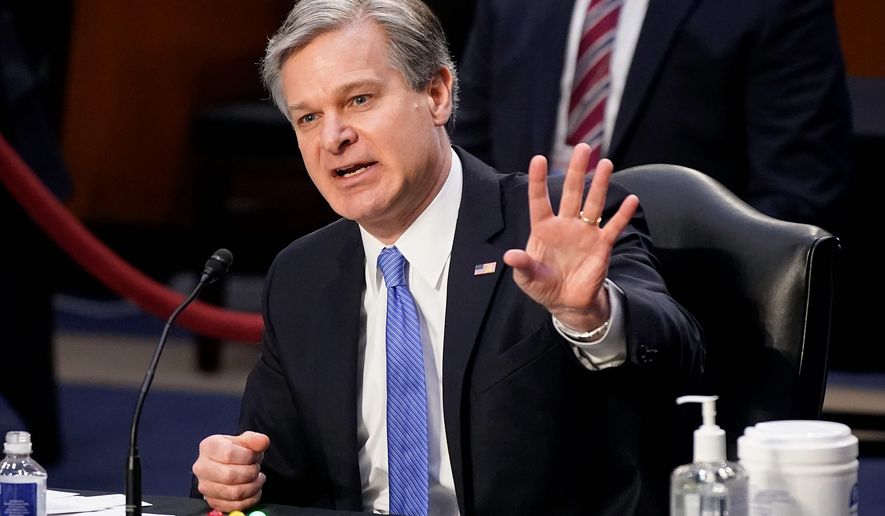FBI Director Christopher A. Wray on Tuesday fended off hostile lawmakers from both parties who blamed him for the bureau’s failure to catch warning signs ahead of the Jan. 6 attack on the U.S. Capitol.
He insisted that a report warning of extremists threatening “war” at the Capitol was passed through channels, even though he admitted he didn’t see the report until “some number of days” after the riot.
He said the threat was specific enough to issue a warning.
“Even though it sounded somewhat aspirational in nature and was unverified, the smartest thing to do, the most prudent thing to do, was just to push it to the people who needed to get it,” he told the Senate Judiciary Committee.
Former U.S. Capitol Police Chief Steven Sund and acting Washington Police Chief Robert J. Contee previously said they didn’t see the Jan. 5 report until long after the riot.
Mr. Wray insisted, however, that the information was passed along in under an hour of the report.
It was sent as an email to the joint terrorism task force that includes both members of the U.S. Capitol Police and Metropolitan Police; it was communicated verbally to key officials and, third, it was posted on a law enforcement portal viewed by law enforcement across the country, he said.
He didn’t have an answer for why the report was missed.
On another front, Sen. John Kennedy, Louisiana Republican, asked the FBI director if he disciplined anyone for the bungling of a surveillance application to monitor 2016 Trump campaign aide Carter Page.
Mr. Wray said that every single person, even those mentioned in passing, had been referred to the FBI’s Office of Professional Responsibility, which is the bureau’s disciplinary arm.
He did not say if any of the employees have been disciplined or how many employees have been impacted. Mr. Wray also cautioned that some FBI officials mentioned in the report left the bureau before the report was released, meaning the agency couldn’t take action against them.
The disciplinary process has been “slowed down” so as not to interfere with special counsel John Durham’s criminal review of the early stages of the FBI probe into potential ties between members of former President Donald Trump’s campaign and Russian operatives, according to Mr. Wray.
Inspector General Michael E. Horowitz in 2019 issued a damning assessment of the FBI’s actions during the early stages of the Russia collusion probe. It concluded that FBI employees withheld or doctored evidence to obtain a surveillance warrant for a Trump campaign official.
Mr. Horowitz also concluded that surveillance applications submitted to a court to obtain the warrants were riddled with errors and shoddy work.
The report ultimately led to the prosecution of Kevin Clinesmith, a former FBI lawyer who admitted he doctored evidence to justify the bureau’s surveillance of Mr. Page. He was sentenced to a year of probation.
On the Capitol attack, Mr. Wray said the FBI deemed it to be domestic terrorism.
“That siege was criminal behavior, plain and simple, and it’s behavior that we, the FBI, view as domestic terrorism,” Mr. Wray said. “Jan. 6 is not an isolated incident. The problem of domestic terrorism isn’t going away.”
The FBI received more than 270,000 tips from Americans that have led agents to identify and arrest people who allegedly participated in the attack. Many of those tips have come from rioters’ relatives, he said.
So far the FBI has charged more than 300 people allegedly involved in the riot, Mr. Wray said.
The bureau hasn’t seen any evidence that left-leaning violent extremist groups such as Antifa were involved in the deadly insurrection.
“We have not to date seen any evidence of anarchist violent extremists or people subscribed to Antifa in connection with the sixth,” said Mr. Wray. “That doesn’t mean we’re not looking, and we’ll continue to look, but at the moment we have not seen that.”
• Jeff Mordock can be reached at jmordock@washingtontimes.com.




Please read our comment policy before commenting.